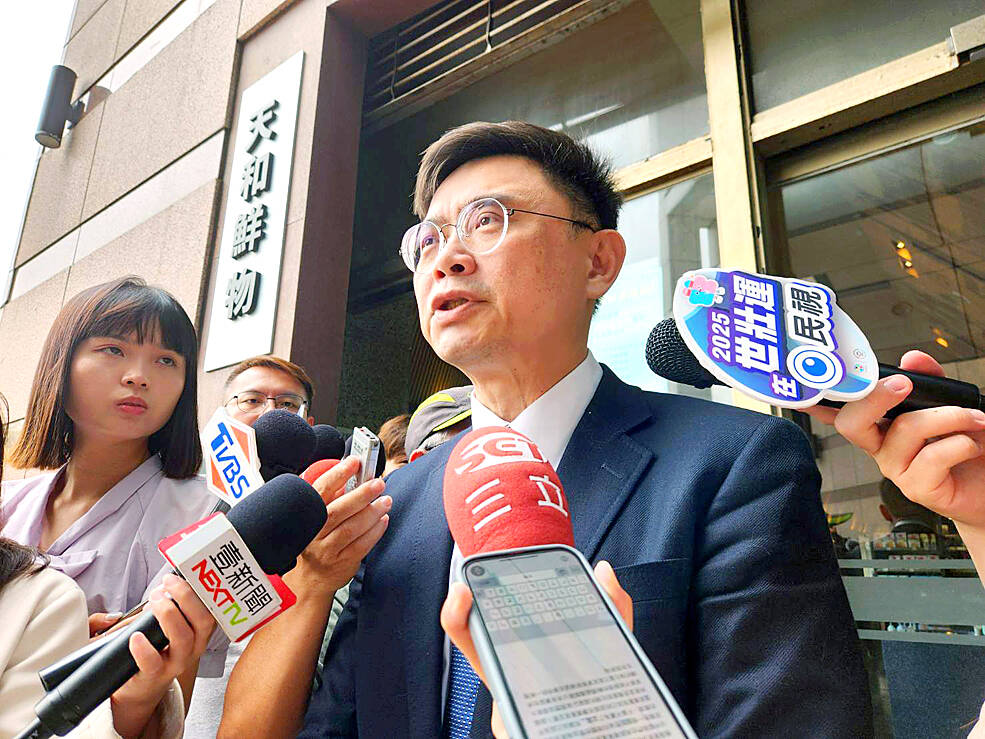The Democratic Progressive Party (DPP) on Wednesday expelled five members accused of spying for China, including a former Presidential Office staffer.
The DPP said its Central Evaluation Committee had agreed unanimously to expel the five members to "safeguard party discipline and national security."
"The current international situation is grim, and Taiwan is facing threats from the Chinese Communist Party," it said in a statement. "The actions of those involved in the [spying] cases not only violated the laws of our country, but also clearly violated the discipline and core values of our party."

Photo: CNA
The DPP said it was the first time members of the party had been caught allegedly spying for China.
Among the five accused are a former aide to National Security Council chief Joseph Wu when he was foreign minister, as well as a person who had worked for Lai when he was vice president and then president, the Central News Agency reported.
The DPP did not say if the five had been charged and no one in the Taipei District Prosecutors' Office was immediately available to comment.
The number of people prosecuted for spying for Beijing has risen sharply in recent years, with retired and serving members of the military the main targets of Chinese infiltration efforts, official figures show.
The National Security Bureau said previously 64 people were prosecuted for Chinese espionage last year, compared with 48 in 2023 and 10 in 2022.
Last year, they included 15 veterans and 28 active service members, with prison sentences reaching as high as 20 years.

Alain Robert, known as the "French Spider-Man," praised Alex Honnold as exceptionally well-prepared after the US climber completed a free solo ascent of Taipei 101 yesterday. Robert said Honnold's ascent of the 508m-tall skyscraper in just more than one-and-a-half hours without using safety ropes or equipment was a remarkable achievement. "This is my life," he said in an interview conducted in French, adding that he liked the feeling of being "on the edge of danger." The 63-year-old Frenchman climbed Taipei 101 using ropes in December 2004, taking about four hours to reach the top. On a one-to-10 scale of difficulty, Robert said Taipei 101

Nipah virus infection is to be officially listed as a category 5 notifiable infectious disease in Taiwan in March, while clinical treatment guidelines are being formulated, the Centers for Disease Control (CDC) said yesterday. With Nipah infections being reported in other countries and considering its relatively high fatality rate, the centers on Jan. 16 announced that it would be listed as a notifiable infectious disease to bolster the nation’s systematic early warning system and increase public awareness, the CDC said. Bangladesh reported four fatal cases last year in separate districts, with three linked to raw date palm sap consumption, CDC Epidemic Intelligence

Two Taiwanese prosecutors were questioned by Chinese security personnel at their hotel during a trip to China’s Henan Province this month, the Mainland Affairs Council (MAC) said yesterday. The officers had personal information on the prosecutors, including “when they were assigned to their posts, their work locations and job titles,” MAC Deputy Minister and spokesman Liang Wen-chieh (梁文傑) said. On top of asking about their agencies and positions, the officers also questioned the prosecutors about the Cross-Strait Joint Crime-Fighting and Judicial Mutual Assistance Agreement, a pact that serves as the framework for Taiwan-China cooperation on combating crime and providing judicial assistance, Liang

US climber Alex Honnold left Taiwan this morning a day after completing a free-solo ascent of Taipei 101, a feat that drew cheers from onlookers and gained widespread international attention. Honnold yesterday scaled the 101-story skyscraper without a rope or safety harness. The climb — the highest urban free-solo ascent ever attempted — took just more than 90 minutes and was streamed live on Netflix. It was covered by major international news outlets including CNN, the New York Times, the Guardian and the Wall Street Journal. As Honnold prepared to leave Taiwan today, he attracted a crowd when he and his wife, Sanni,